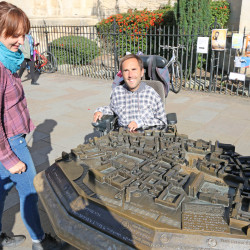I have been what’s known as ‘disabled’ my whole life – oh, how society loves labels! I have a genetic condition called Spinal Muscular Atrophy, which means I’m about as physically useful as a chocolate teapot...
On top if this potentially dire situation, let’s look at my disability shopping list:
- Accessible housing – Very difficult to find, never cheap and usually requires ramps and adapted bathrooms/kitchen after moving in.
- Equipment – Electric bed (for comfort and pressure sores), electric wheelchair (for independent mobility), a hoist (to lift me), shower chair on wheels (to not smell), kitchen gadgets (eg.kettle tipper), and much more.
- Social care – The recruitment, training and salary costs of employing people for my independent living needs. Tasks include: dressing me, personal hygiene, house chores, assisting me in using the toilet, going to work, seeing friends and turning me at night. Plus, there are their additional costs when on shift (food, accommodation, travel, leisure).
- Health – Physiotherapy and swimming are very important. Prescriptions for antibiotics are required more than average in winter.
- Other living costs – Higher energy bills to stop winter colds and charge electric equipment. Higher water usage. Costs of servicing equipment. Accessible transport is often more expensive than inaccessible options (see London’s tube map!). Accessible holidays have a higher mark up too.
I could go on and on… so how do I deal with these costs?
Funding
Fortunately, parts of this are covered by government funds. I get support in certain areas because I’m more ‘disabled’ than average, because I understand my rights, and in some ways because I’m ‘lucky’ with the postcode lottery we play.
If anyone narrow minded goes crazy at you about the costs of disabled people on the government, please tell them this: unless death or social isolation is your thing, investing in us not just right, but also better for everyone.
Being independent means we are healthier and happier, saving future costs of hospital admissions and GP time. We can work, spend our money back into the economy, contribute tax and share our skills/knowledge/experience for others to use. We also employ and pay people using the social care money, who in turn also spend in the economy, pay tax and are valuable assets to society.
Despite the government funded support, there are a lot of costs not covered. Granted, the Disability Living Allowance is in recognition of our extra costs. But unfortunately the maths still shows that we struggle to break even. And when we do succeed, the system takes it back again.
Non-financial costs
But away from the nuts and bolts of living, for me there are mental and emotional costs of all the bureaucracy too. The form filling, meetings, assessment, reassessments, employment responsibilities, silly rules, threats of budget cuts and actual cuts. All on top of trying to just live a ‘normal’ life.
On a positive note
Beyond the social stereotypes we face, and partly because of the support, I do everything my family does, I have non-disabled and disabled friends, I attended a mainstream school, went to university, got drunk, lost my virginity, learnt to drive, graduated, worked in human resources and as a fundraiser with Scope for 6 years, went onto co-run Disability Horizons, travel the world and change it in my own little way.
On the one hand I hope my experience shows what is possible with the rightful funding, resilience, and a positive attitude. Equally, I want to show the unnecessarily difficult reality of being disabled in 2014. The possible regression we are facing thanks to new policy suggestions is worrying. Next year I will be facing big fears, doubts and worries about my personal finances and disability support package once the Independent Living Fund closes.
What about you? I’d love to hear about your life ambitions, hurdles you’ve overcome, your higher costs of disability, and achievements despite the struggle.
Submit your extra costs story to Scope’s independent Extra Costs Commission
Find out more about the extra costs of being disabled by playing The Price is Wrong
Martyn
Tweets @martynsibley
World Changer @ www.martynsibley.com
Co Founder @ www.
Social Media Man @ sma.sunnierdays.co.uk
Healthy Goodness @ www.todaherbal.co.uk






You also seem to have friends from other places whom appear without your knowledge Martyn on your various websites . Is this intentional or accidental Martyn.?
At last an honest, yet not maudlin, account of day to day life as a disabled person. The extra costs are phenomenal. Not to mention sourcing comfortable but fashionable clothing, accessible furniture without buying children’s stuff all the time, and spending more on a weekly shop to justify delivery charges and not relying on being able to ‘pop’ into a food shop on the day you’re using it etc.
Like you, I did the mainstream school /uni thing, but not the independent living until my 30s. I was worried I wouldn’t cope (hate that word) but for the last 5 years have been doing more than ‘coping’ in my own place. But the adaptions have been gradual due to social services and contractors. It’s hard making do until the adaptions are in place.
Thanks for your article. Really interesting.
Vanessa
I have degenerative disc desease anx have had all my life. I have been unable to work since 2006 and barely got by on dla and incapasity benefit. Since esa took over they deam me able to work (which im not). Then dropped me £450 a month. Then was paying our morgage. Then decided not to pay it and not to tell us or the morgage company, leaving us on the verge of homelesess. They have refused to deal with it. Now because ae dont get esa I cant get the home modifications I desperatly need. No one will help us. We spenx at least one week a month without gas and electrick as we cant afford it. But where can we go? Nowhere!